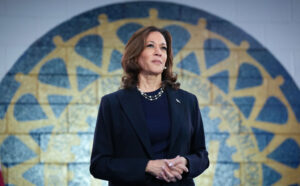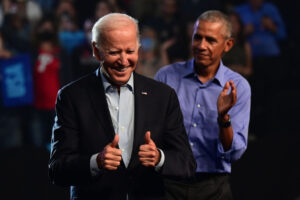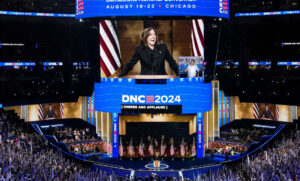Making an elephant disappear is a notoriously difficult test of the magician’s art. Turning a flower girl into a duchess might be even harder to pull off. Convincing the world’s most powerful man to agree to give up his job and his house to a younger rival without any visible use of force is, most people would agree, a trick that surpasses them both. In the space of the past month, culminating in their week-long party Convention in Chicago last week, the behind-the-scenes wizards who run the Democratic Party pulled off all three.
The challenge the Democrats face now is whether the public will ultimately be beguiled by their razzle-dazzle, or whether the effect of making so many audacious, hard-to-swallow moves in so short a period of time will be that none of them are ultimately believable. But that is a problem for another day. With Donald Trump looking like a bona fide hero, and their own candidate looking like a corpse, the Democrats had their backs up against the wall. They left Chicago with a spring in their step, their heads held high, and a new Queen.
Once the nets slung across the ceiling of the United Center were finally empty, after burying the likely next President of the United States, Kamala Harris, her running mate Tim Walz, and their respective families beneath a giant pile of red, white and blue balloons, it was clear to everyone in the arena that they had witnessed political magic. It wasn’t Harris’s acceptance speech, which was a solid B or B+, with most of that grade being awarded for simply fulfilling its purpose. By not being an obvious failure, the speech plausibly established Harris as a fresh character who might, maybe, if everyone closes their eyes all together and wishes on a star, transcend the scorched-earth narratives spun by Joe Biden and Donald Trump — two ancient political dinosaurs who probably remember the birth of the sun.
The truth is that Harris was there, too — having in fact been serving as Biden’s Vice President for the past three and a half years. But no matter. No one really holds Harris responsible for anything, the Democrats are betting, in part because she left so little visible imprint on events. The fact that few Americans have any real idea of who Harris is means that she could plausibly be branded as whatever people say they want right now, while Donald Trump, an ex-President whose imprint on the public consciousness is indelible, could be framed as the man responsible for all the bitterness and bad feeling that the country hopes to transcend through the magic of — what is her name again? — Kamala Harris.
It was telling that on the last night of the convention, the script doctors were still writing bits in which small children taught the audience how to pronounce their candidate’s name: “Kah-Mah-Lah”. The absence of name recognition this late in the game is a problem, yes — but is one that can be solved with a big-enough media megaphone. Luckily for them, the Party owns one.
So, who is Kamala Harris again? Looking at her face on the United Center Jumbotron, one of the first things one might reasonably notice is that, nearing 60, she is, objectively, a strikingly beautiful woman, in a profession in which neither men nor women are particularly known for their physical charms. Saying that someone in Washington is attractive is like saying someone in Hollywood is a deep thinker. A heavy discount is assumed. As the old chestnut goes: “Washington is Hollywood for ugly people.”
The truly remarkable thing about Harris’s face, though, is how unfamiliar it remains to most Americans. The American political system is a machine for rocketing obscurities like Arkansas governor Bill Clinton or first-term US Senator Barack Obama or reality game show host Donald Trump to the heights of global power, but the reality of wall-to-wall media exposure means that each of these figures, or at least their brands, was a known quantity by the time they were nominated. For the better part of the past century, every major party candidate has slogged through the psychic and practical tests of two solid years of speeches and fundraising events with mega-rich donors and political bosses and ordinary union members, then winning a majority of delegates in hard-fought national primaries punctuated by three or five or seven lengthy debates with dwindling numbers of other candidates, before stepping out in the front of the general public as the Next New Thing.
Kamala Harris has done very little of that. Her abortive 2020 presidential campaign was a flop, and she dropped out of the race before a single vote was cast. Added to the ticket at the apparent behest of the Democratic Party’s eternal leader, Barack Obama — reportedly over the strong objections of Jill Biden — Harris had a single, forgettable vice-presidential debate with Mike Pence, which did neither one of them any favours. Thanks to Covid, the rest of the Biden-Harris campaign was nearly void of public appearances; upon taking office, Harris was probably the least-familiar vice president in modern American history.
The candidate’s past four years as Vice President have done little to make her more familiar to people living outside of Washington DC. A flurry of welcoming attention at the beginning of Biden’s Presidency was followed by a thankless appointment as the Administration’s “Border Tsar”. The disaster that followed was greeted with a series of negative profiles in reliably liberal outlets, which suggested that Harris was a capricious, unlikeable boss who had trouble retaining staff and was out of her depth in a policy role. Rumour also had it that she drank during the day. The Vice President was then shunted out of the spotlight — under the assumption that further large-scale public exposure was unlikely to do either her or Biden any favours.
That was true as recently as the end of June. When whispers about Biden’ cognitive decline became louder in the wake of his disastrous June debate performance against Donald Trump, whispers about dumping Harris from the ticket, which had circulated earlier in Biden’s presidency, began to gain more momentum. Some party figures began talking about an open convention, at which a familiar, tested figure like Hillary Clinton might ignite the enthusiasm of the party faithful.
Instead, through a mysterious mechanism that can be found nowhere in the US Constitution or Democratic Party by-laws, it was Joe Biden, the sitting President of the United States, who was forced off the ticket in July, only a month before the convention, which just happened to be held in Barack Obama’s political hometown of Chicago. Having an open convention was judged to be undesirable, or impossible. Instead, Harris would be the Party’s nominee, and the convention delegates — whose choice of candidate ostensibly reflects the democratic will of the Party — would rubber-stamp her candidacy by Zoom, avoiding any possibility of messiness inside the convention hall in late August.
As far as marriages go, the match between Harris and the Democrats was more of the five-week shotgun wedding variety than a romance for the ages. And with the wedding coming up fast, the Party’s new bride needed a makeover. In the three weeks before the convention, Harris was duly transformed from a surly, almost forgotten loser in DC power games to a shining new star whose watchword was “joy”. But all of that was a prelude to the great unknown of Chicago. Would there be riots? Would Kamala laugh in a way that alarmed the nation? How to squeeze so many plot reversals into such a short period of time, without fracturing the space-time continuum?
As for the question of who Kamala Harris truly is, the answer was that even the overwhelming majority of her fervent supporters couldn’t care less. Before July, there were no fervent Kamala Harris supporters. In reality, Democrats aren’t voting for Harris, though they may learn to love her over time; they are voting for the Democrats, which is a powerful political vertical that can draw upon the best image-making talent in the country. The goal that the entire party could agree on was beating Donald Trump, which was the thing that Harris’s acceptance speech was engineered to achieve.
The first section of that speech was a masterpiece, which Harris inhabited perfectly. Written in a classic American voice, at once soaring and plainspoken, and inflected by newer immigrant stories, it told of Harris being raised along with her younger sister Maya in a working-class neighbourhood in gritty Oakland by their tough-minded doctor-mother who travelled all the way from India to America to cure cancer. There were touching memories of moving trucks, before the family found a home in a middle-class neighbourhood where a host of friendly neighbours stood ready to help out whenever Mom worked late.
No doubt the details of this story are all verifiable. But as an autobiographical narrative, they served to elide as much of Harris’s upbringing as they revealed — the early estrangement between her parents, culminating in a bitter divorce and custody battle, which was followed by her mother moving Harris and her sister from Oakland to, of all places, Montreal, where the official language is French. There was little mention of her African-American heritage, which the Party chose to emphasise through her sister Maya’s more performative blackness and hairstyle. What happened to her relationship with her father after she was a toddler? Are they at least on speaking turns? Didn’t her mother die of cancer, instead of curing it?
As prime-time soap opera, the Harris story still has some kinks to work out. From the cheap seats at the top of the arena, though, it was possible to imagine during the first quarter of the speech that one was watching history being made, like during Obama’s inaugural Convention speech in 2004, or his acceptance speech in 2008. We were watching something new, or at least the unveiling of a promising new product line, targeted particularly at the Party’s core demographic of single women, with growth potential among married women, too — Obama Lite.
Then it all came crashing down, thanks to whoever on the script-writing committee decided to abandon positivity and recycle old attack lines against Donald Trump, which is the type of work that is best left to surrogates at the wedding party. No one wants to hear the bride herself go negative. Harris’s manner audibly changed while delivering the attack lines, and her voice became unpleasantly insinuating and cynical. The writing itself was lazy, and made the candidate seem unpleasantly like a hack. The spell was broken.
After digging herself into a hole, Harris then managed to climb out, by passionately, and with real feeling, endorsing both Israel’s right to real security and unlimited American backing and armaments, and, at the very same time, the absolute right of Palestinians to freedom and self-determination, presumably in a free and independent Palestinian state. That both these miracles can be achieved at the same time, and in fact make each other possible, is one of the magic formulas of American Middle East diplomacy that have no apparent basis in reality. But for a moment, Harris made the pairing seem convincing. More importantly, in doing so, she conveyed strength, passion and toughness.
One takeaway for the Party’s script writers should be that Harris is at her best when conveying strength. She sounds like a warrior. That’s because she’s a prosecutor at heart rather than a social justice advocate or a deep thinker. Conversely, she sounds worst when she seems cynical about the law, which is a professional risk of being a prosecutor, or when she tries to explain geopolitics, or spout poetry. Leave that stuff to Obama, who held the crowd in the palm of his hand on Tuesday night by uttering bromides about ending political division that might have been recycled from decade-old National Public Radio shows. It worked, though, because Obama wields his stiletto in the dark, and his level of political skill and feel is off the charts.
All told, the Chicago Miracle, as it will doubtlessly be known, was a reality-fracturing magic act, akin to seeing your grandmother get up from the dinner table and flawlessly replicate Olga Korbut’s famous “Doom Loop” from the 1972 Olympics. Less than two months ago, the Democrats looked to be in bad shape — and that was before Trump was shot at a rally in Butler, Pennsylvania, and responded by pumping his fist in the air and yelling “Fight!”. That was magic, too.
Now a greater magic act has happened: Joe Biden is gone, and the three and a half years of his failed Presidency are gone along with him. As speaker after speaker emphasised, Trump represents the past, while the Party represents the future. Trump represents himself, while the Party represents us. The rhetorical opposition is an effective one. Magically, the Democratic candidate plausibly represents change and the people fighting against power, when the Democrats themselves are in fact the party in power.
The crowd helped, too. The green-haired gender gremlins, antifa rioters masked in keffiyehs, and accusatory and divisive racial rhetoric — all of that was magically banished. It was as if someone somewhere had flipped a switch, or threatened to cut off the checks to the Party’s radical organiser class, and made the Democrats the party of normal Americans again. Everywhere you looked in the United Center on Thursday night, there were Americans of all races and creeds waving the American flag and breaking out into spontaneous chants of “USA! USA!”. Moreover, the chants seemed entirely sincere. Yes, the people in the hall would dutifully follow the party wherever it led, but it turns out that most of them are more comfortable expressing pride in their country and waving the flag than they are in calling for abolishing the police or demanding that public-school children use genderless bathrooms. Maybe all the weirdness and seeming insanity of the past eight years was just a bad dream, or the product of some kind of Right-wing AI deepfake manipulation.
Or maybe the Party image-makers, faced with the sudden disintegration of the agreed-upon pseudo-reality in which Joe Biden was running the country so successfully that he was on the verge of becoming the greatest American President since FDR, used the awesome machinery at their disposal to construct a new pseudo-reality in the space of five weeks, and then jammed it into everyone’s brains. Yes, we lied to you non-stop for the past three and half years about who was running the country, and what we were actually up to — but cross our hearts, we are now telling you the truth. Kamala Harris will make tough decisions about a more compassionate and inclusive merit-based American future of opportunity while defending freedom around the globe Also, she’s a beauty queen. Also, we love football.
Faced with such wonders, the brain can’t help but rebel against familiar sensory inputs. Did I just see that? Of course not. Except, it’s right there in front of me. Is the world that I can see, feel, and touch real? Or is it simply a guided projection, engineered by unseen and potentially malevolent forces. And if nothing is real, why not believe in what everyone else also wants to believe in. Perhaps the safest choice, under the circumstances, is to hover somewhere between belief and disbelief while hoping that the people in charge of the big show come up with an even newer, better script once Donald Trump is finally gone.
Disclaimer
Some of the posts we share are controversial and we do not necessarily agree with them in the whole extend. Sometimes we agree with the content or part of it but we do not agree with the narration or language. Nevertheless we find them somehow interesting, valuable and/or informative or we share them, because we strongly believe in freedom of speech, free press and journalism. We strongly encourage you to have a critical approach to all the content, do your own research and analysis to build your own opinion.
We would be glad to have your feedback.
Source: UnHerd Read the original article here: https://unherd.com/





